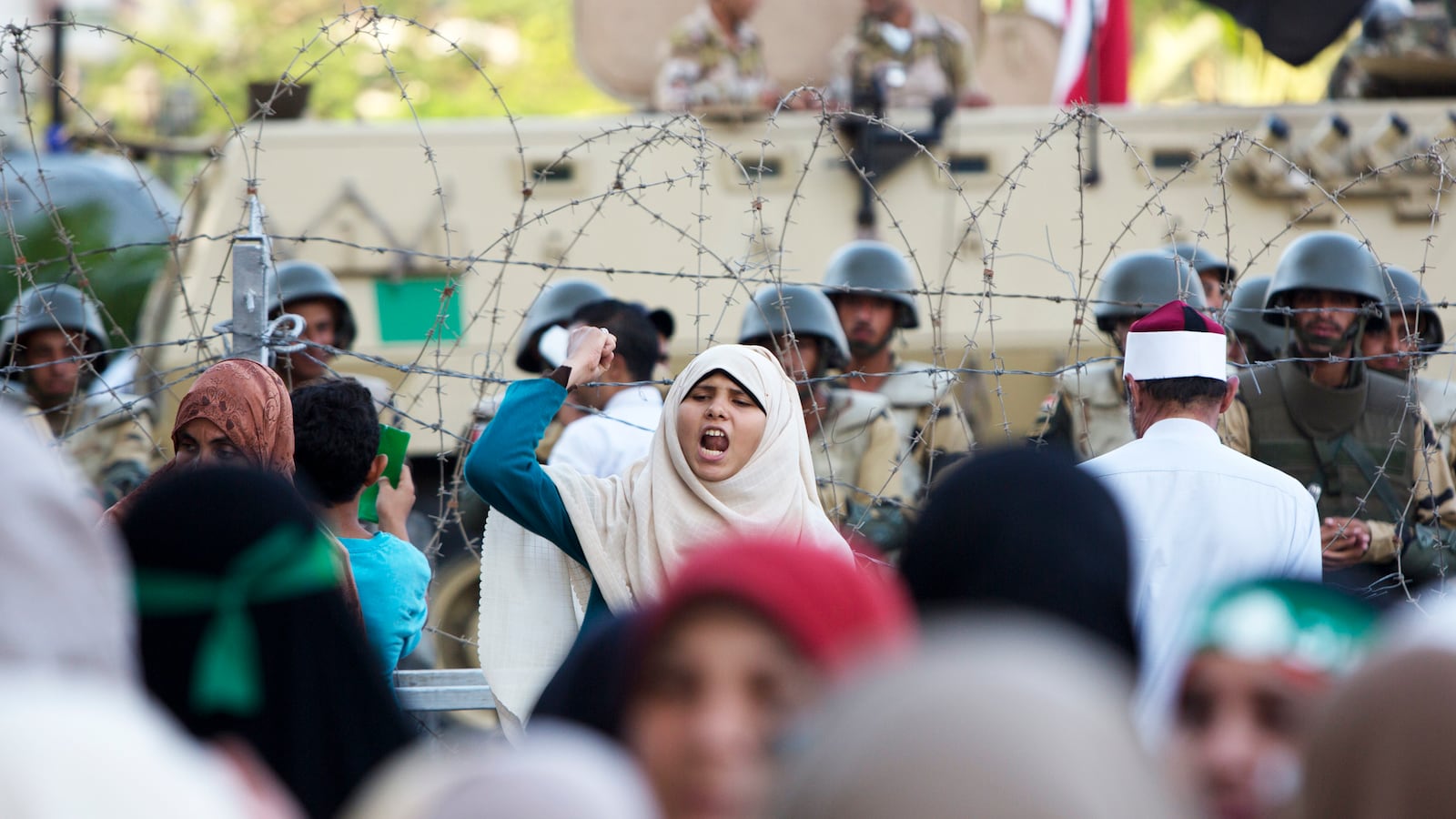Hager El Saway is an assistant lecturer of dental radiology at Cairo University. When she speaks—whether in a lecture hall or over a coffee—she has a striking presence. Under the Mubarak regime, when she was denied the right to work at the university because of her religious beliefs and political affiliation, she filed a lawsuit against the government—and won. Hager is a proud female member of the Muslim Brotherhood, a group that has long been seen as a boys’ club of conservative, bearded men.

Following the 2011 revolution, Hager, like many other women, took on a more public role within the organization. But now, with the ousting of Mohamed Morsi and subsequent bloodshed, Islamist women say they are afraid the Muslim Brotherhood will be pushed underground once again, inhibiting their newly established voice.
“Muslim Brotherhood women weren’t seen as women before the revolution because they were afraid of politically participating and being arrested,” Hager said assertively. “Women—especially very conservative women—didn’t go out. Now, women in niqabs stand in demonstrations alongside men.”
But with the president’s removal from power by the army following mass public disapproval of his leadership, and the arrests of senior leaders within the Muslim Brotherhood, Hager fears that a return to Mubarak’s days are just around the corner. This fear is one of the driving factors for the pro-Morsi contingent’s refusal to back down and accept the downfall of their embattled president—and what he represents. It is an idea echoed throughout Cairo’s main Islamist sit-in protest in Nasr City: to give up fighting means death, both physical and religious.
“We won’t allow people to be rounded up from their homes again,” Hager said with an air of fear reminiscent of a time when police interrogated her about her political views and places of worship. “It’s a witch hunt.”
Following Monday’s massacre of over 50 pro-Morsi protesters at the Republican Guard headquarters—other protesters say they were peacefully protesting, although the army adamantly refutes this claim—the likelihood of continued violence has increased dramatically. While many Islamist demonstrators insist that they are committed to nonviolent protest against what they see as an unjust military coup against a democratically elected leader, there have been a slew of violent clashes and attacks that many Egyptians say were initiated by Muslim Brotherhood sympathizers. Islamist political leaders have called for the people to rise up against the army, and Sinai militant groups loyal to the deposed Islamist leader have warned of severe retaliation against army and police in the increasingly lawless region.
Muslim Brotherhood women, who feel they are unfairly characterized by more liberal Egyptians and foreign media as passive and suppressed, are afraid they will lose their ability to protest and publically participate in Egypt’s political spectrum, further fueling this perception.
“The people in Tahrir say [Islamist] women are not respected and educated,” said Dr. Abeer Barakat, a Muslim Brotherhood member, public-health professor, mother of four children, and up until last week, assistant minister of health for preventive medicine in Morsi’s Freedom and Justice Party. “But look at me—I’m well educated, a university professor. The men in my party respect me and listen to me as if I was a man.”
Abeer, who says she was helping to spearhead an ambitious public-health campaign before Morsi was ousted, has been joining hundreds of other women in Islamist protests across Cairo since June 30. She has no intention to stop demonstrating until the former president is returned to power.
For many Muslim Brotherhood women, religion is seen as the best, if only, way to achieve real freedom and order. They view religion as an integral part of politics and daily life.
“Islam is the solution to everything,” said Brotherhood member Sanaa Ismail. “It applies to women’s issues, too. We create homes with these ideals.”
But one of the major qualms against Morsi among opposition protesters is what many Egyptians see as a “Brotherhoodization” and “Islamization” of Egyptian law and politics. Protesters particularly find issue with Morsi’s Islamist-dominated Constitution that many Egyptians say does not represent their more secular, liberal interests.
In a video reportedly from October 2012 that has gone viral in Egypt in recent days, an eloquent young boy voices his opinion of the Islamist-backed Morsi government. “Politically speaking—where is the constitution that represents us?” he asks the television reporter. “For example, women are half the society. How come there are only seven ladies in the constitutional assembly?”
Activists slammed Morsi’s constitutional draft, pointing to several issues, including what they feared to be an Islamist interpretation of women’s rights, the repeated referral to women as “caregivers,” as well as the removal of a clause setting a minimum age for women to get married.
As Egypt dives deeper into political upheaval, even as interim leadership and constitutional declarations are put in place, it appears that Morsi’s supporters have absolutely no intention of keeping quiet. Brotherhood member Fatma Saad El Din, who has been protesting in Nasr City for days, says her role as a woman complicates, but also strengthens, her will to fight.
“I have a national duty as a woman, as an Egyptian, and as a Muslim to defend my rights and my role as a Muslim Brotherhood member,” she said. “I stand for truth.”





